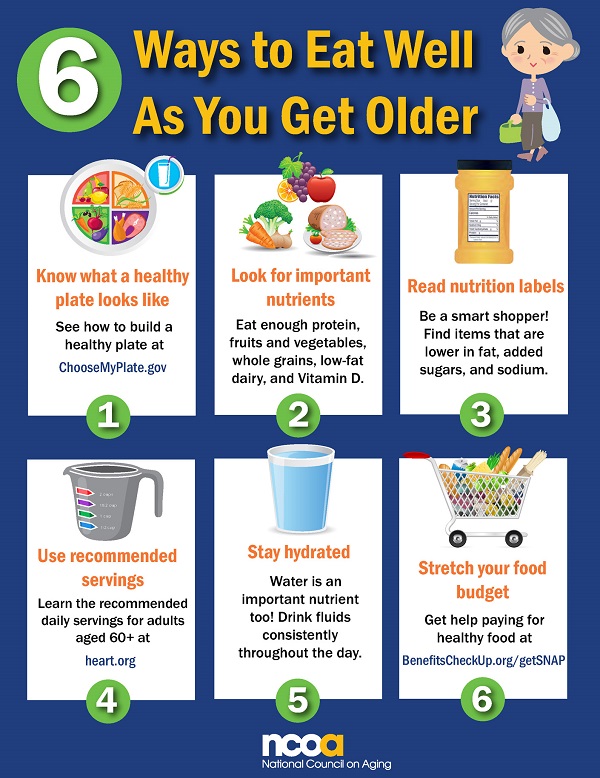Undeniably, eating healthy is crucial at any age. However, choosing the right food becomes increasingly important as you reach midlife and beyond. A healthy diet can help to boost the immune system, increase resistance to illness, and improve mental acuteness. In this article, we will tell you what foods seniors should avoid and what they should eat.
Eating well can also impact your ability to maintain a positive outlook and retain emotional stability. Contrary to popular belief, healthy eating does not have to be about sacrifice and dieting. Instead, it’s all about following a healthy diet for seniors and enjoying tasty, fresh, and wholesome ingredients in family and friends.
Foods Senior Should Avoid in their Diets
Aside from knowing the healthy foods for seniors, it is also crucial to know the foods seniors should avoid.
Below is a list of the foods seniors should avoid at all cost:
Oysters, Mussels, and Clams
While raw seafood contains vitamins and minerals that can help boost the immune system, it also contains bacteria. Like unpasteurized milk, raw seafood is often not heated at temperatures high enough to kill lingering bacteria.
Seniors looking for immune system boosting foods can opt for cooked options such as baked tilapia or grilled salmon. Cooked fish is another excellent option. It is just as nutritious as raw seafood. It also pays to remember that food poisoning risk is relatively lower when food is smoked, grilled, or baked as opposed to eating raw.
Soft Cheese
While cheese is an excellent source of vitamin D and calcium, softer varieties are considered one of those not good for seniors who have weakened immune systems or delicate stomachs.
If you can use some energy and immune system boost, try goat cheese and Brie. Both are rarely sterilized, and they are traditionally kept at room temperatures while in transit and on the store shelves.
Sprouts
It’s easy to mistake sprouts as one of the foods that’s ideal for older adults. However, just like soft cheese, they are not a good option for seniors with digestive disorders and compromised immune systems. Rather than eating sprouts, try replacing it with green beans and carrots instead.
Cold Meats
Cold meats like chorizo, salami, and Parma ham are cured, fermented, and not pre-cooked. This increases the risk of developing diseases like toxoplasmosis. Some studies indicate that the parasite Toxoplasma gondii is linked to various neurodegenerative diseases like Alzheimer’s.
Multigrain Bread
Ideally, older adults should consume healthy foods that can give their immune systems the much-needed boost. However, with so many options available, it can be challenging for seniors to figure out exactly what products to buy.
For instance, while multigrain bread can seem healthy, it is nothing more than white bread filled with preservatives. It is also full of unnecessary carbohydrates and empty calories.
Unpasteurized Juice
Drinking fresh juice is a great way for seniors to get the essential minerals and vitamins they need to stay healthy. However, they should avoid commercial juices that have not been pasteurized.
In line with this, it would be a good idea to invest in a juicer. Juice from most vegetables and fruits are safe to drink. Seniors can also experiment with various products until they find a combination that suits them best.

Healthy Eating for Seniors: Answers to Frequently Asked Questions
While nutritional needs can vary from one person to another, there are specific strategies seniors can observe to ensure they are getting the nutrients their body needs.
What should seniors eat?
To stay healthy, fit, and strong, eating nutrient-rich foods is recommended. Consuming nutrient-rich foods can help ensure they get the minerals, vitamins, proteins, fats, and carbohydrates their body needs to stay healthy.
Nutrient-dense foods include:
- Fruits and vegetables
- Lentils
- Seeds and nuts
- Low-fat dairy
- Lean proteins
- Nuts and seeds
It is also ideal to limit the consumption of foods that are low in nutrients but high in calories. For instance, consider desserts, sweetened beverages, and deep-fried foods as nothing more than occasional retreats.
What is a good breakfast for seniors?
Making healthy food choices entails a good understanding of the type of nutrition the body needs and reaching those daily nutritional goals through healthy food options. To start their day on a good note, the following are good breakfast choices for seniors:
- Eggs
- Oatmeal
- Soft Fresh Fruits
- Smoothies
What are some nutrition hacks so seniors can stay healthier and stronger?
Minimize sodium
Hack: Instead of bacon, make eggplant “bacon.” This tasty and nutritious vegetable can help reduce sodium intake.
Guard the gut
Hack: Make black bean burgers! While red meat limits the growth of good bacteria, black beans encourage it.
Feast on fiber
Hack: Use whole wheat flour instead of white flour to get some extra fiber.
Mind your vitamins
Hack: Eat more vegetables and fruits as they are naturally full of vitamins and minerals.
Harness your hydration
Hack: Drink your calories. Count smoothies and soups in your recommended daily liquid intake.
Conclusion
As important as it is to ensure a loved one has access to high-quality Caregiverlist-recommended care when needed, your loved one’s diet should always be a key consideration regardless if the senior lives alone or in a community. Finding creative, fun, and easy ways to incorporate healthy, fresh, nutrient-rich foods to their diet can make a world of difference in their health and longevity.

Melissa Andrews is the Content Marketing Strategist for Paradise Living Centers, an assisted living center for seniors with locations in Paradise Valley and Phoenix, Arizona. In her spare time, she enjoys cooking and going on hiking trips with her siblings and cousins.
